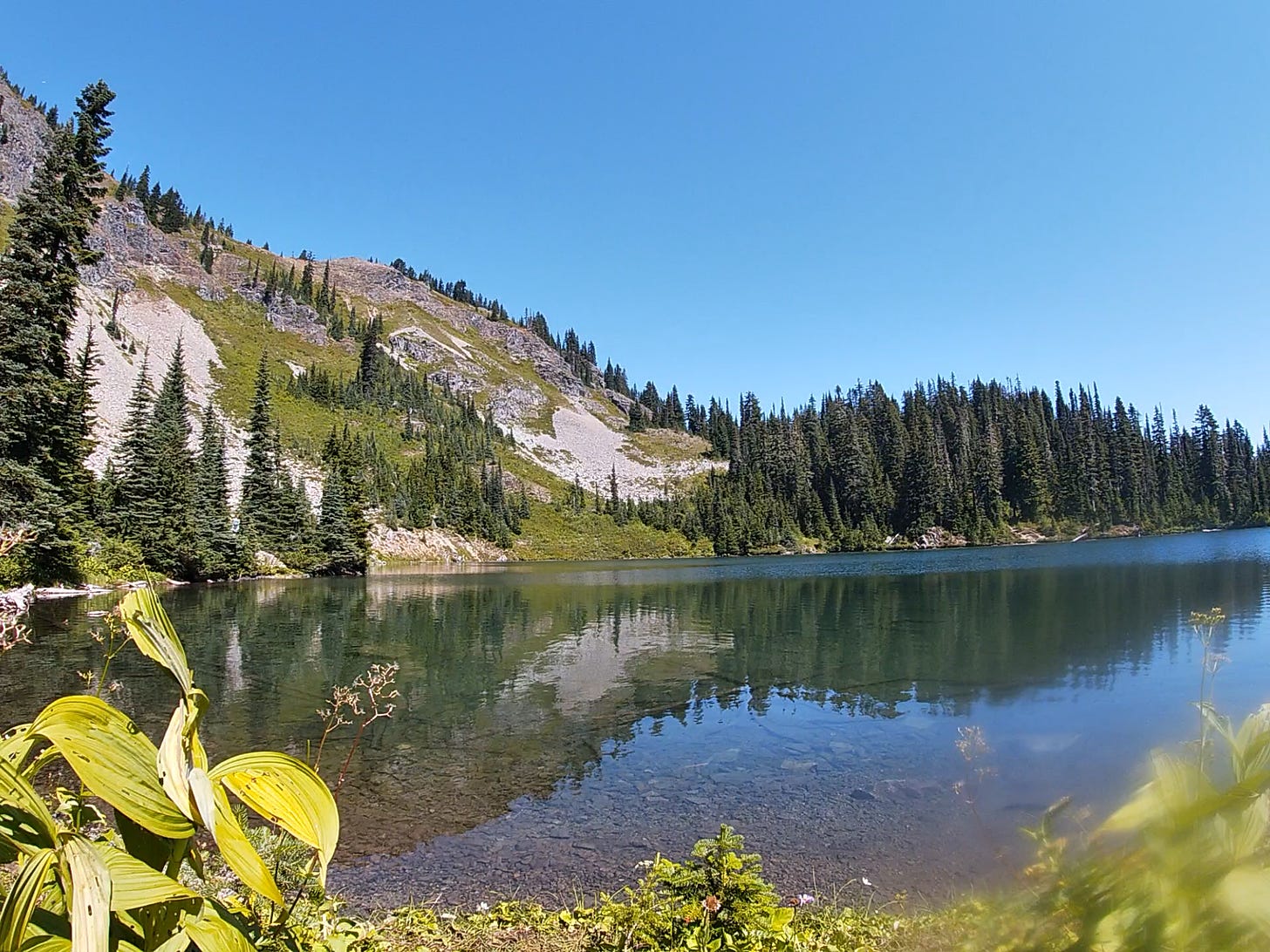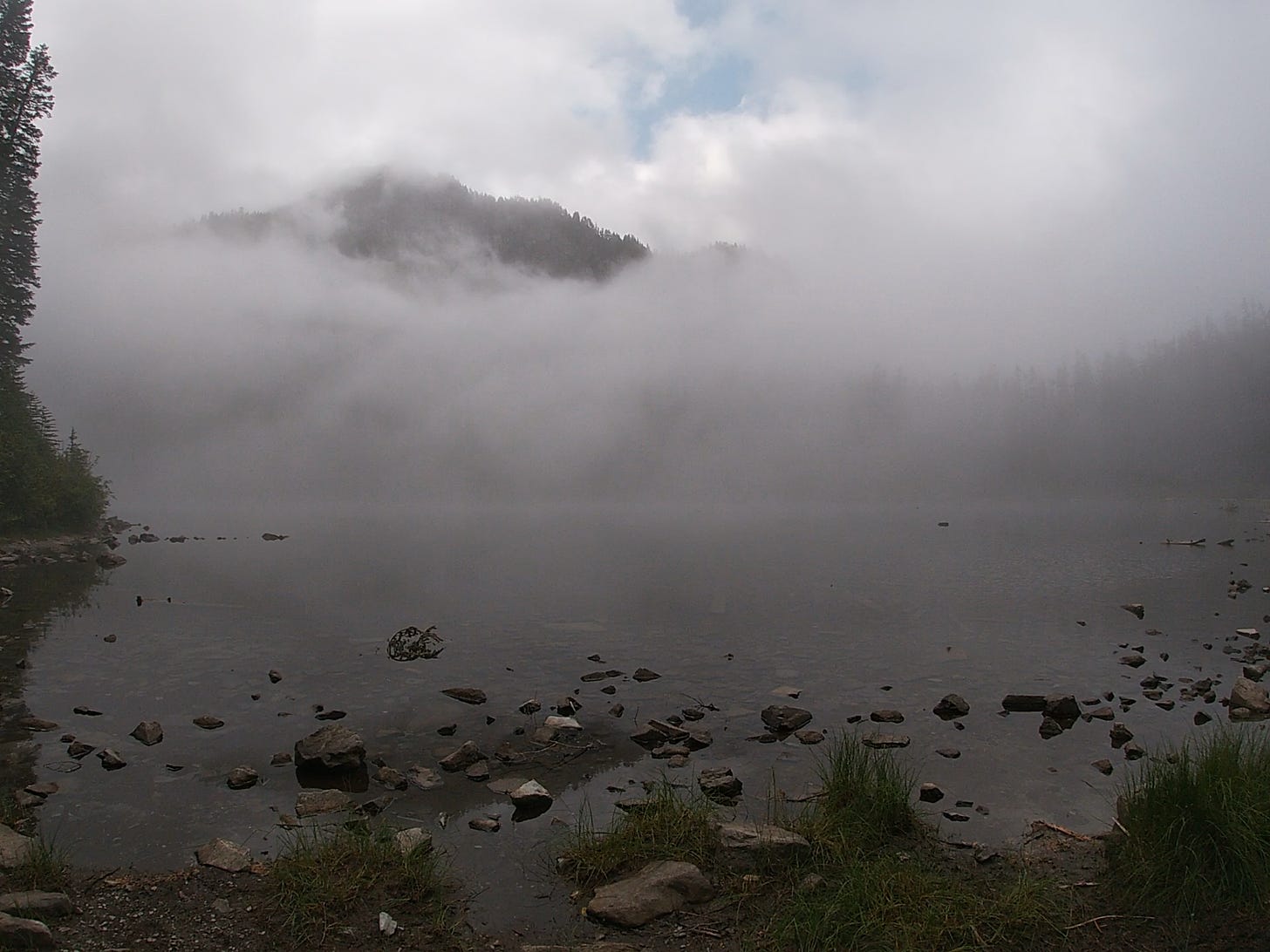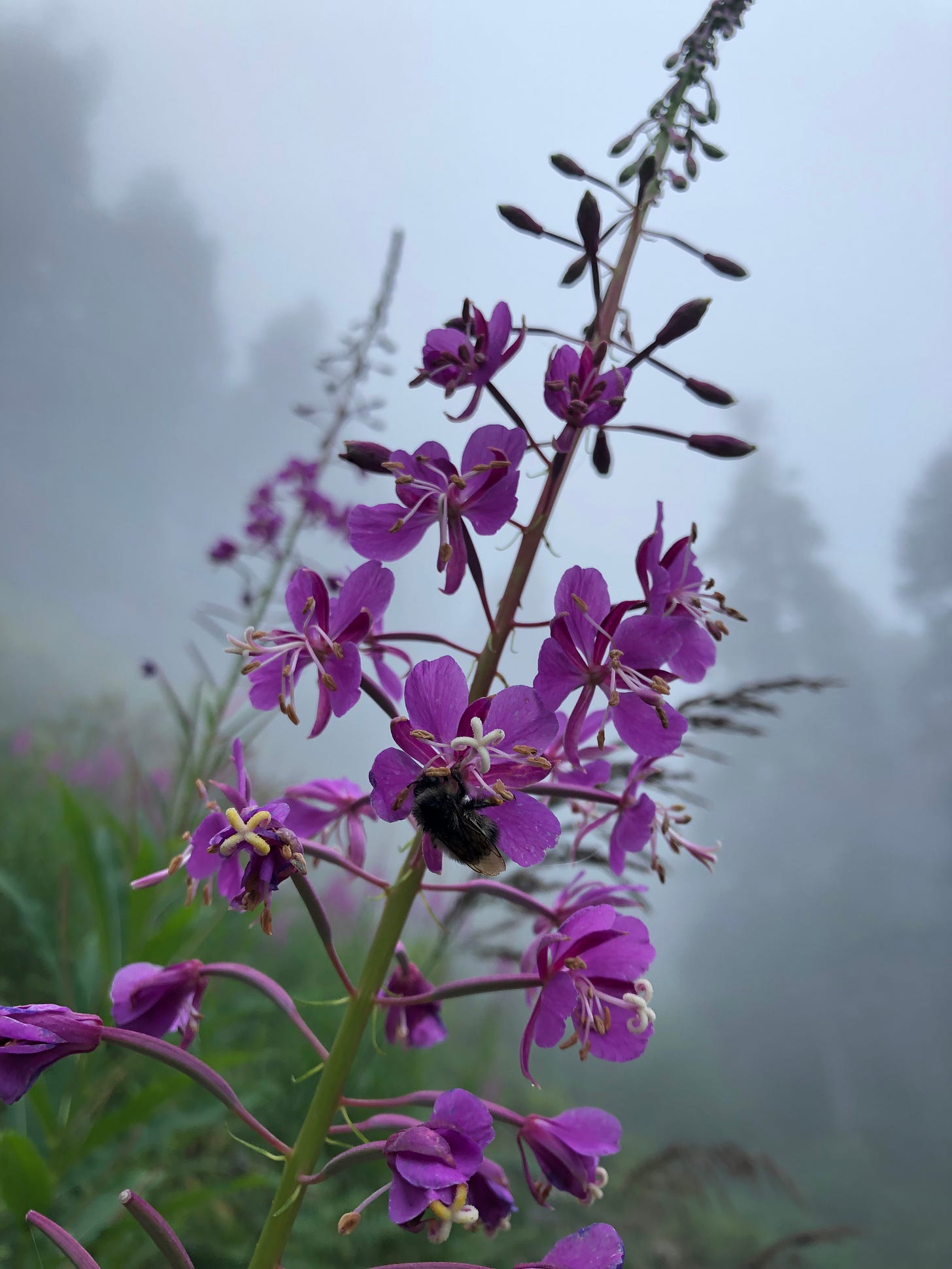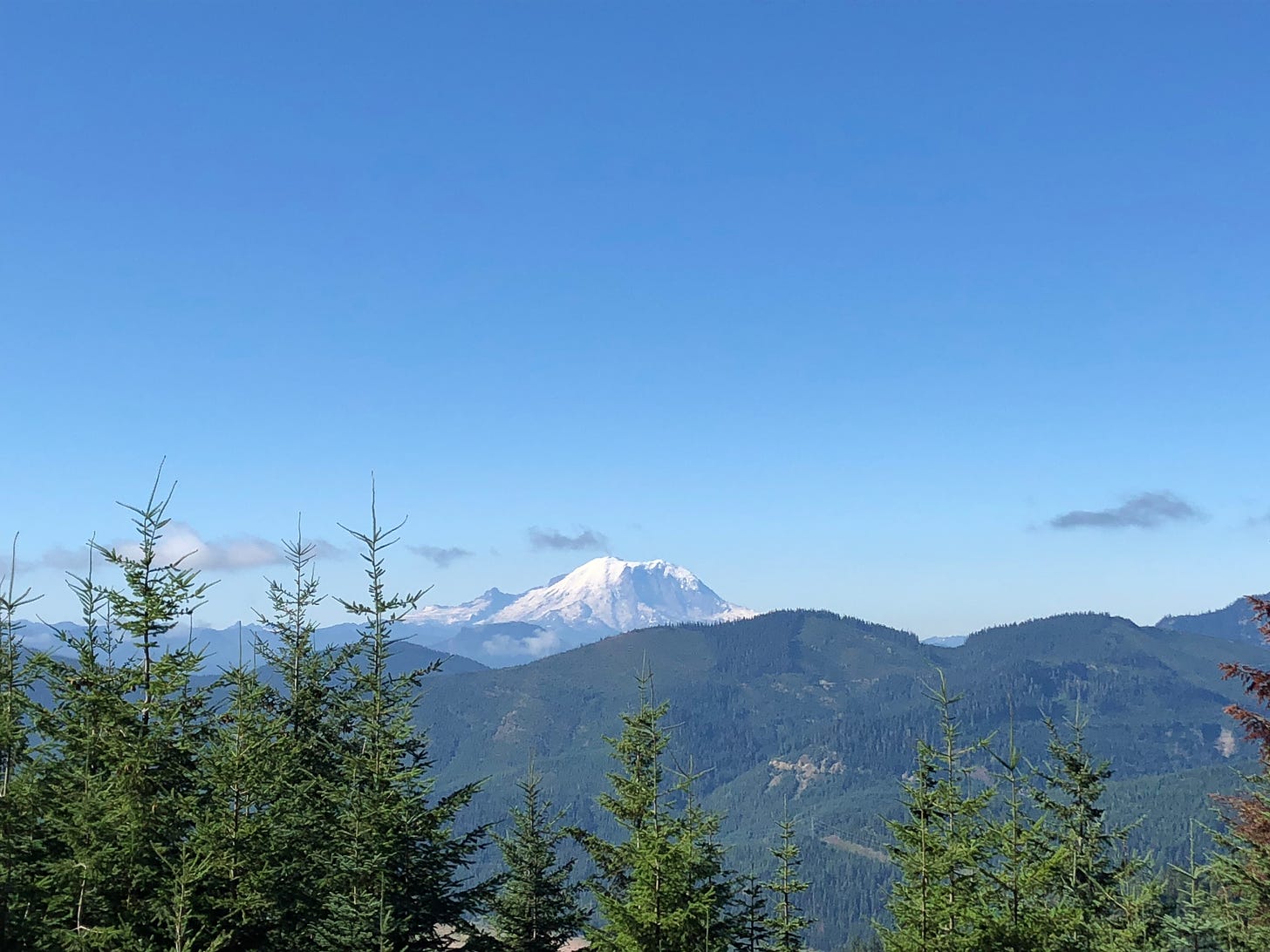Tabs Open #21: There's Always A Chance We'll Like The Burglars

Sitting at the edge of an alpine lake with my wife and some friends on Sunday, we found cause to wonder: how, exactly, do fish get into them? The lakes sit pretty high up, and often there’s no apparent connecting waterway with any body lower down.
Such a question inevitably gives way to others; how does anyone get anywhere? How was it decided to put the trail here and not there, what did they carry on their backs as they tramped it out? Were they barefoot or booted, did they imagine that someday all these people would follow their footsteps, did they stop to enjoy the wildflowers and pick the huckleberries.
I can’t say for sure about any of that but it turns out that sometimes the state stocks the lakes with fish and sometimes the population is a holdover from when the glaciers receded and sometimes it was the indigenous people who stocked the lakes a long time ago. Other people speculate that birds occasionally drop them or get eggs stuck to their legs traveling between lakes but the evidence for that is dubious at best.
As far as I’m aware there are no lakes in the Marshall Islands, way out in the central Pacific. But there are plenty of fish. The Marshallese have a more confident approach to these questions of water than I do; accordingly, there’s a proverb of theirs that I’d like to share with you:
Kwôtuöom, tuur lometo ak bôruôn armej kwôban. We enter and understand the sea, but not the hearts of people.
The really thorny part of it all is that it applies to yourself, too, if you’re anything like me. There’s a whole lot of wrestling to figure out who you really are and what you want, and the conclusions are more often than not incomplete.

To wit: recently I’ve talked with a few important people in my life about how relatively unhappy I’ve been this past year. I have yet to fall into the kind of crippling, days-long depressive/anxious spiral that has intermittently pockmarked my life, true. But I have also had a pretty steady, vibrating hum of low-grade anxiety this whole time. Trouble in letting go, in casting aside. I have made room for very little in the way of real joy.
So it felt incredible to find that I was smiling to myself anew at nearly every turn of the hikes I took last Friday and Sunday. Here a particularly fragrant stand of cedar, there a framed view of Washington’s grandest mountain, there the fog touching the lake. My own body shifting back into a feeling of comparative use, and a grin to follow it.
Friday’s trail crossed an old logging road, boxed in everywhere by ferns and fireweed. Remarkable, really: no matter how many of either I see I never tire of their simple beauty, their reliable geometry. The forest needs trees to tower above everything but it also needs a soft and decorative carpet worth paying attention to.
On each day I found a fireweed plant with a bumblebee sleeping in the cup of a flower, which I felt very fortunate to notice.

I was once again reminded how out of practice I’ve gotten at being with myself, pushing myself with no available distractions. Hiking doesn’t come as naturally as it once did; the minutes just do not run off the clock like they used to. But isn’t the point of hiking to hike, not just to get somewhere and check a box? It takes active practice to remember this and to be present.
Sometimes. Other times the perfume of the cedars is so strong and the light and fog hit each other just right and you’re reminded that this is what makes you happiest, this being out in the woods. This chance to feel strong and to connect once more with what we were long ago.
Apologies that this dispatch has thus far been pretty inward-facing. I always have a few demons to exorcise as the summer winds to a close.
On Sunday’s hike, in which we accidentally managed to turn a 9-miler into a 15-miler, I heard two ravens calling back and forth. Eventually one came flying across the valley above the lake and landed in a tree close to the other. It was a day of extravagant, abundant visual pleasures; it was water for the kind of spiritual thirst I’ve outlined above.
Anyway maybe Robert Hass had my kind of thinking pegged. Here’s Meditation at Lagunitas:
All the new thinking is about loss.
In this it resembles all the old thinking.
The idea, for example, that each particular erases
the luminous clarity of a general idea. That the clown-
faced woodpecker probing the dead sculpted trunk
of that black birch is, by his presence,
some tragic falling off from a first world
of undivided light. Or the other notion that,
because there is in this world no one thing
to which the bramble of blackberry corresponds,
a word is elegy to what it signifies.
We talked about it late last night and in the voice
of my friend, there was a thin wire of grief, a tone
almost querulous. After a while I understood that,
talking this way, everything dissolves: justice,
pine, hair, woman, you and I. There was a woman
I made love to and I remembered how, holding
her small shoulders in my hands sometimes,
I felt a violent wonder at her presence
like a thirst for salt, for my childhood river
with its island willows, silly music from the pleasure boat,
muddy places where we caught the little orange-silver fish
called pumpkinseed. It hardly had to do with her.
Longing, we say, because desire is full
of endless distances. I must have been the same to her.
But I remember so much, the way her hands dismantled bread,
the thing her father said that hurt her, what
she dreamed. There are moments when the body is as numinous
as words, days that are the good flesh continuing.
Such tenderness, those afternoons and evenings,
saying blackberry, blackberry, blackberry.

I don’t know for sure where I stand on a word being elegy to what it signifies, though while I’m eating them out on trail I find myself unconcerned with the specific divisions between huckleberries and wild blueberries, which are pretty hard to tell apart. (Blackberries, in both taste and appearance, are thankfully in a category by themselves.) Though maybe giving a name to it does overcomplicate the simple pleasure of picking a warm ripe berry some hundreds of feet above where you started and feeling it dissolve in your mouth.
And longing! Desire really is made of distance, isn’t it. At its heart that’s where all this trouble lies, this anxiety and unhappiness: it’s in being somewhere, spiritually and mentally, other than where I’d desperately like to be.

I’d like to close this week with what reads to me as an endorsement of the idea that sometimes you do have to let go and see how things play out. It comes to us from Brian Andreas’ brilliant and quirky Story People (I’d also recommend his Still Mostly True: Collected Stories and Drawings):
When we lived in the city we used to leave the lights on to keep away the burglars. Now we leave the lights off to keep away the neighbors. My mom says it’s because there’s always a chance we’ll like the burglars.
That’s it for this week. See you next Wednesday.
-Chuck



